Faculty and Student Research
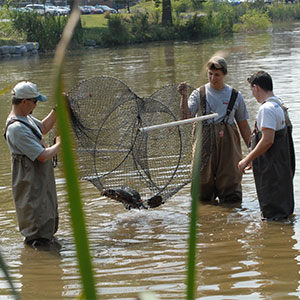
Dr. David Bowne's Lab
Spatial population dynamics of aquatic turtles
Dr. Bowne and his students are conducting long-term studies of painted turtles in northern Virginia and on the Elizabethtown College campus to determine what factors influence the populations of these animals.Amphibian use of agricultural streams: They are determining the factors that influence the presence and abundance of salamanders in agricultural streams in Lancaster County, PA.Antibiotic resistance in the environment: Dr. Bowne and Dr. Wohl are conducting a landscape-level analysis of the factors that contribute to antibiotic resistance in soil bacteria. They are investigating the role of land use and soil metals in causing antibiotic resistance.Ecological Research as Education Network (EREN): Dr. Bowne is a founding member of a National Science Foundation (NSF)-funded collaborative network of ecologists at primarily undergraduate institutions. The mission of this network is to enhance ecological research and teaching at undergraduate colleges.
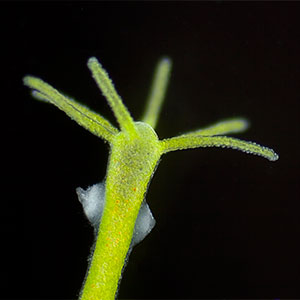
Dr. Diane Bridge's Lab
Using the invertebrate Hydra to study stem cells and diseases of aging
Hydra species are morphologically simple invertebrates with relatively few identifiable cell types. Surprisingly, many genes important for understanding human diseases are also present in Hydra. Dr. Bridge and the students working with her are currently using Hydra to study the biology of aging. Previous studies suggest that members of the species Hydra vulgaris can survive indefinitely without declines in health, while members of the species Hydra oligactis experience increasing physical deterioration and eventually death following reproduction. Dr. Bridge and her students are working to determine the causes of the extreme difference in lifespan between the species. Using approaches including analysis of gene expression, modification of gene expression, and elimination of specific cell types, they are investigating the roles of several genes which could potentially be involved in maintaining Hydra stem cell populations and extending lifespan. Future research plans include use of next-generation DNA sequencing techniques to identify genes involved in protecting cells from stress-induced damage.
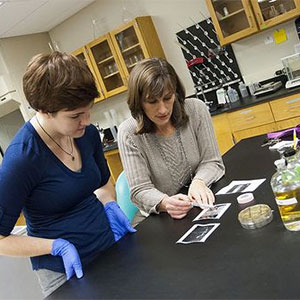
Dr. Jane Cavender's Lab
Investigation of Simian Virus 40 (SV40) Induced Tumorigenesis
Our lab focuses on elucidating the mechanisms of cellular transformation by the SV40 T antigen oncoprotein. Student groups are investigating how this oncoprotein binds to specific host proteins; how the protein is able to block differentiation; or which of the protein's functions/activities cause increases in nucleolar number and size. These properties are then correlated to T antigen's ability to transform cells. If the specific functions that are necessary and sufficient for transformation can be identified, then more appropriate chemotherapeutics can be designed to target these critical activities.
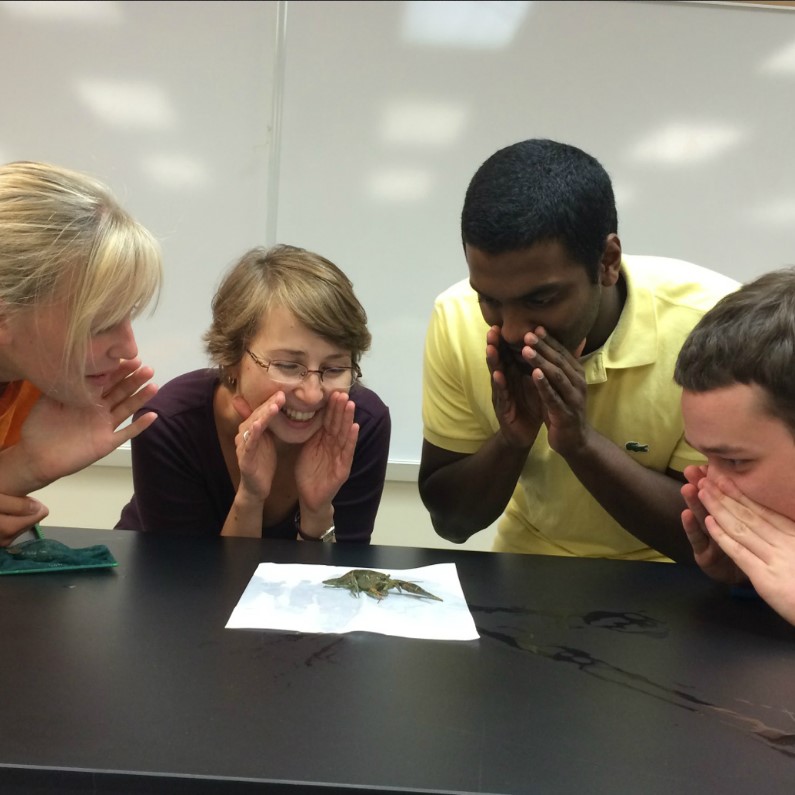
Dr. Anya Goldina's Lab
Behavioral endocrinology lab
The ability to survive in one’s environment is highly dependent on the animal’s ability to identify social status, mating willingness, and competition state of other individuals within its social group. Animals use multiple sources of information to learn about their environment and to assess their own status within a social hierarchy. In my lab, we use local crayfish species to understand how social environment and social experience mediate social status establishment. Crayfish communicate by releasing chemical signals into the water, which communicate information about individual molt status, sex, social status, and species identity. We are particularly interested in understanding how social experience combines with the chemical signals that crayfish perceive from other individuals around them to modify their behavior. We are also comparing chemical communication in native and invasive crayfish species in the local watersheds. Current projects in the lab focus on examining species-specific responses to chemical signals produced by invasive and native crustacean species in different social contexts. We hope to apply our findings in developing more effective methods for preventing and eradicating invasive crustaceans.
Current projects include:
- Discrimination behavior of invasive crayfish species to diverse chemical signals
- Assessing the relationship between chemical communication and social experience
- The effect of social status on serotonin sensitivity
- Role of communication networks in social experience and social status stability
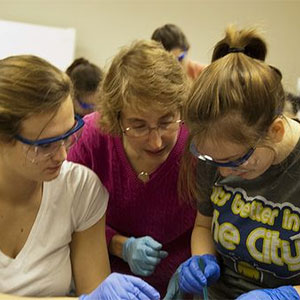
Dr. Deb Wohl's Lab
Preservation of fecal matter to personalize fecal matter transplants (FMTs)
Dr. Woh's Lab is currently researching how best to preserve the microbiome under periods of duress. Specifically they are studying fecal matter and its preservation for use in fecal matter transplants (FMTs). Ultimately, they would like to advance personalized medicine by being able to restore a healthy microbiome in individuals whose microbiome has been disrupted by illness or medical treatments.
Return to Top
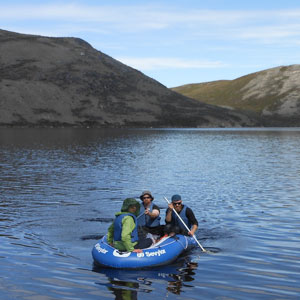
Dr. Robert Northington's Lab
Dr. Northington is an aquatic ecosystem ecologist interested in how both lotic (rivers and streams) and lentic (lake) systems function under a variety of environmental and human-caused factors. I am especially interested in how climate change influences the ability of aquatic systems to function. My research has spanned both temperate and Arctic systems, and has addressed questions related to the energetic sources of complex food webs, methane dynamics, drought, nutrient processing, decomposition, and biogeochemical change. I also really enjoy collaborating with a variety of researchers and disciplines to answer complex questions related to environmental change. My current research projects include long-term analysis of lake chemical and thermal changes in Arctic Greenland, which grew out of my post-doctoral research. Additional work in Greenland focuses on the potential security and availability of water resources for Inuit sheep farmers in South Greenland given recent changes in precipitation and temperature patterns in the region. I am also working with colleagues in Maine on changes in the biological and chemical features of remote lakes and how these may relate to local declines in sport fishes. I am always interested in finding new research projects and working with a variety of students, researchers, professionals, and the public to better understand our local and regional water resources.

